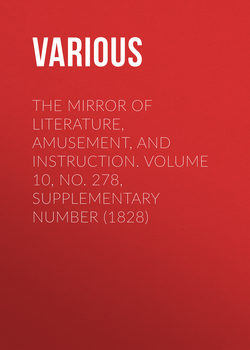The Mirror of Literature, Amusement, and Instruction. Volume 10, No. 278, Supplementary Number (1828)

Реклама. ООО «ЛитРес», ИНН: 7719571260.
Оглавление
Various. The Mirror of Literature, Amusement, and Instruction. Volume 10, No. 278, Supplementary Number (1828)
THE NEW PALACE IN ST. JAMES'S PARK
ST. JAMES'S PARK
INTENDED IMPROVEMENTS IN THE PARKS
Arcana of Science
CAPTAIN PARRY'S EXPEDITION
Отрывок из книги
Palaces are at all times objects of national interest, or rather they are national concerns. They belong to the attributes of royalty, and in some instances have been erected by a grateful people to celebrate the virtues of patriot princes. We therefore make no apology to our readers for occupying so large a portion of the present Supplementary Number with the representations and details of the New Palace, (the exterior of which is just now completed,) and of the consequent improvements in the adjoining Parks; since we are persuaded that the patriotic feelings of our subscribers will hail them as subjects of paramount importance. The great Lord Bacon, who treated these matters with the gravity of a philosopher, in his "Essays," gives a "brief model of a princely palace;" and in our times Napoleon is known to have expended many thousands in restoring the gilding of the palace at Versailles—although the extravagance of its founders paved the way for the events in which he distinguished himself.
In architectural improvement, London has made greater advances since the late peace, than in the entire century which preceded that auspicious event. Being unquestionably the richest, the largest, and most populous city of Europe, the seat of a wealthier court, and a more opulent body of nobility and gentry than any other metropolis, it seems only a reasonable expectation that it should likewise excel all others in the number and magnificence of its public edifices and private dwellings. Such, however, is not the case; for, till within the last few years, that most splendid and impressive of all the arts, architecture, has been almost wholly neglected.
.....
The annexed view is of the central entrance front, facing east, towards the Canal and the Horse Guards, taken from the Wall in St. James's Park. The first objection is the site, in itself insuperable, as will appear from the following remarks on the subject by Mr. Loudon, editor of the Gardener's Magazine:—
"Had the problem," he says, "been proposed (how) to alter Buckingham House and gardens, so as to render the former as unhealthy a dwelling as possible, it could not have been better solved than by the works now executed. The belt of trees which forms the margin of these grounds, has long acted as the sides of a basin, or small valley, to retain the vapours which were collected within; and which, when the basin was full, could only flow out by the lower extremity, over the roofs of the stables and other buildings at the palace. What vapour did not escape in this manner, found its way through between the sterns of the trees which adjoin these buildings, and through the palace windows. Now, all the leading improvements on the grounds have a direct tendency to increase this evil. They consist in thickening the marginal belts on both sides of the hollow with evergreens, to shut out London: in one place substituting for the belt an immense bank of earth, to shut out the stables; and in the area of the grounds forming numerous flower-gardens, and other scenes with dug surfaces, a basin, fountains, and a lake of several acres. The effect of all this will be a more copious and rapid exhalation of moisture from the water, dug earth, and increased surface of foliage; and a more complete dam to prevent the escape of this moist atmosphere, otherwise than through the windows, or over the top of the palace. The garden may be considered as a pond brimful of fog, the ornamental water as the perpetual supply of this fog, the palace as a cascade which it flows over, and the windows as the sluices which it passes through. We defy any medical man, or meteorologist, to prove the contrary of what we assert, viz. that Buckingham Palace is a dam to a pond of watery vapour, and that the pond will always be filled with vapour to the level of the top of the dam. The only question is, how far this vapour is entitled to be called malaria. We have the misfortune to be able to answer that question experimentally.... A man must be something less or more than a king, to keep his health in that palace for any length of time."
.....